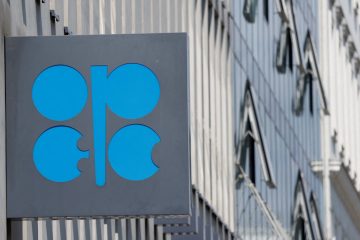Oil prices rise 2% on fears Suez blockage may last weeks

Oil prices reversed a sharp sell-off a day earlier to rise about 2% on Friday on mounting fears that it could take weeks to dislodge a giant container ship blocking the Suez Canal, which would squeeze supplies of crude and refined products.
Prices, however, were still headed for a third consecutive weekly loss, with the outlook for demand dented by fresh coronavirus lockdowns in Europe.
Brent crude was higher by $1.09, or 1.8%, at $63.04 a barrel by 0750 GMT, after dropping 3.8% on Thursday.
U.S. West Texas Intermediate (WTI) crude was up
$1.22, or 2.1%, at $59.78 a barrel, having tumbled 4.3% a day earlier.
Both benchmarks were on track for a small weekly loss, following a more than 6% decline last week.
The trapped container ship is blocking traffic in the Suez Canal, one of the world’s busiest shipping channels for oil and refined fuels, grain and other trade between Asia and Europe.
Officials stopped all ships entering the canal on Thursday, and a salvage company said the vessel may take weeks to free.
“Fears of supply tightness grew as the key Suez Canal remained blocked by the giant ship, outweighing concerns over weak demand due to lockdowns in Europe and Asia,” said Satoru Yoshida, a commodity analyst with Rakuten Securities.
Of the 39.2 million barrels per day (bpd) of total seaborne trade in crude in 2020, 1.74 million bpd went through the Suez Canal, according to tanker tracking firm Kpler. Additionally, 1.54 million bpd of refined oil products such as gasoline and diesel fuel flow through the canal, about 9% of global seaborne product trade, Kpler said.
Reeling from the blockage in the Suez Canal, shipping rates for oil product tankers have nearly doubled this week, and several vessels were diverted away from the vital waterway as a giant container ship remained wedged between both banks.
The oil markets were also lifted by worries over escalating geopolitical risk in the Middle East. Yemen’s Houthi forces on Friday said that they launched attacks a day earlier on Saudi Arabia targeting facilities owned by state-owned oil company Saudi Aramco and military sites.
Expectations that the Organization of the Petroleum Exporting Countries and its allies, known as OPEC+, will likely maintain their lower production also supported prices, Nissan Securities researcher Yasushi Osada said.
The producer group is scheduled to meet on April 1 to decide on May supplies, and OPEC+ sources told Reuters they expected the producer group to broadly stick to current lower levels, as the outlook for demand has deteriorated due to new lockdowns in Europe.
Acting a week ahead of the OPEC+ meeting, Abu Dhabi National Oil Company (ADNOC) has deepened crude oil supply cuts to Asian customers in June to 10%-15% from 5%-15% in May, several sources with knowledge of the matter said on Thursday.









